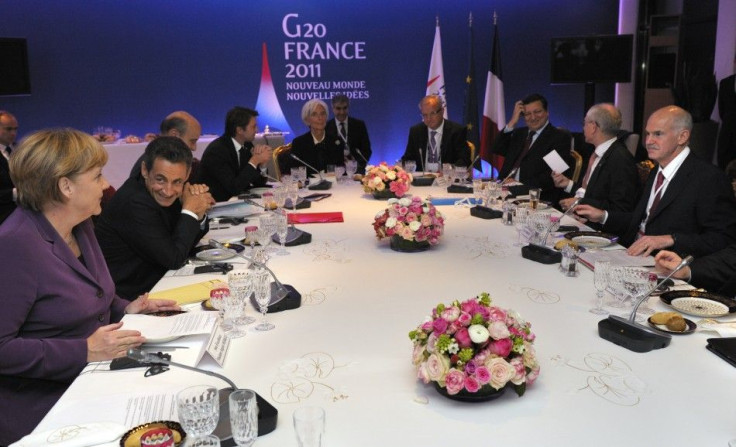G-20 Cannes - U.S., Europe Seek GDP Growth, but May Settle for Greek Solvency
ANALYSIS

Everyone's probably been at a dinner party where the entire focus of the party changed when someone unexpected showed up.
Well, that's what members of the G-20 group will likely experience when they hold their summit Thursday and Friday in Cannes, France.
G-20 nations, which include the United States, China, Russia, United Kingdom, Germany, France, India, Mexico and Brazil, were expected to talk about ways to jump-start GDP growth.
Instead, the unexpected guest -- Greece -- is likely to dominate the discussion.
U.S. Seeks Unanimity
On Wednesday, the United States called for unanimity of purpose at the upcoming G-20 summit regarding the Eurozone crisis, adding that the Obama administration wanted more details on the proposed rescue plans outlined last week, while underscoring that time is of the essence, from an institutional investor standpoint.
In other words, the United States wants a large, decisive answer to the European sovereign debt issue, but one can understand why Europe may not jump to a response at the word of a U.S. request.
Austria's Finance Minister Maria Fekter perhaps best characterized the European Union's mood at the last G-20 summit, when she said, I found it peculiar that even though the Americans have significantly worse fundamental data than the Eurozone, that they tell us what we should do and when we make a suggestion ... that they say no straight away.
Ergo, it's really hard for the United States to exert influence on Eurozone nation-state fiscal responsibility when the U.S. is running a $1.1 trillion to $1.3 trillion annual budget deficit.
A select portion of Europe also sees the global financial crisis as a debt crisis that originated with bad U.S. originations -- originated sub-prime mortgages that failed, causing bonds to collapse, and in some cases, the institutions who held those bond, too.
Appropriate Europe Response Is Complicated
Further, the U.S. goal of getting on top of the sovereign debt issue, now also has to be nuanced. The U.S. wants a large intervention fund to handle Greece, but it would be counter-productive, at least Keynesian economists would argue, for Europe to cut budget deficits in half by 2013 as it pledged in 2010. Cutting deficits that fast will almost certainly tip Europe's economy back into a recession, and it will not help the tepid U.S. economic recovery, either, to say the least.
For example, C. Fred Bergstein, of the Peterson Institute for International Economics, in recent Capitol Hill testimony, said he wants G-20 leaders to postpone it 2010 deficit pledge.
So the U.S.'s likely stance heading in to G-20 may very well be, Establish a gargantuan bailout fund, Europe, and cut your budget deficits, too, but don't cut those deficits too fast, because it could slow Europe/U.S./global GDP growth. And pay no attention to our $1 trillion annual budget deficit.
And you wonder why the United States' stature and influence is not what it was during the globalization era's first decade during the Clinton Administration, 1993-2001?
Greece is Still the Word
That said, the U.S.'s prescriptions and pronouncements may become an after-thought, due to the small, picturesque Mediterranean nation: Greece.
On the heels of Greek Prime Minister George Papandreou's request, Greece's cabinet offered its full support Wednesday for his surprise plan to call a referendum on the nation's intention to accept the Eurozone's €130 billion or $178.6 billion bailout package.
If the people of Greece reject participation in the Eurozone effort, look out. The International Monetary Fund and European Union have threatened to withhold promised bailout money, but that's not likely to sway Greece.
For those who are less-familiar with finance and global economics, here's why:
Greece is a case study of Michael Bloomberg's Rule. The media mogul and now long-time mayor of New York City said, paraphrasing, If you owe the bank $800,000, the bank's got you. But if you owe the bank $5 billion, you've got the bank.
Greece has the bank. And, it looks like, the G-20 summit agenda too.
© Copyright IBTimes 2024. All rights reserved.





















